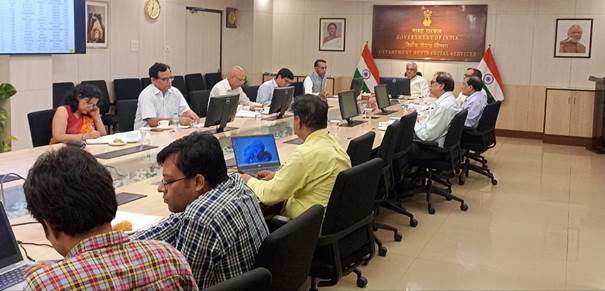Accelerating Financial Inclusion: Reviewing the PM SVANidhi Scheme

Dr. Vivek Joshi, Secretary of the Department of Financial Services (DFS) under the Ministry of Finance, recently chaired a crucial meeting with the Heads of Public Sector Banks to review the progress and performance of financial inclusion schemes, particularly the PM SVANidhi scheme.
During the meeting, Dr. Joshi emphasized the need for expeditious clearance of sanction and disbursement pending applications. He urged banks to devise effective strategies to increase the digital onboarding of street vendors and encourage the adoption of digital payment methods. The primary objective of the PM SVANidhi scheme is to empower street vendors by providing hassle-free access to affordable credit and facilitating their digital inclusion for economic development.
The PM SVANidhi scheme has been making significant strides in providing credit support to street vendors. The Ministry of Housing and Urban Affairs (MoHUA) and DFS jointly monitor its performance to ensure effective implementation across the country. As of 19th July 2023, a staggering 53.41 lakh applications have been sanctioned, with 50.52 lakh applications receiving disbursements totalling Rs. 6,472 crore.
In May 2023, a special campaign was organized by banks and Urban Local Bodies (ULBs) to expedite the process. During the campaign period, a remarkable 6,808 camps were held, resulting in 1,02,358 applications being sanctioned, and 1,01,354 applications being disbursed. Moreover, the campaign led to the digital onboarding of 1,06,432 vendors, highlighting the growing importance of digital inclusion in financial schemes.
DFS urged banks to continue their efforts in creating awareness among street vendors about the various features of the PM SVANidhi scheme. To achieve this, the banks were encouraged to organize workshops, seminars, and financial literacy programs. Moreover, to incentivize digital transactions, street vendors with commendable digital transaction records were to be felicitated.
The PM SVANidhi scheme’s success lies in its commitment to reaching out to the most vulnerable and underserved street vendors across India. By providing accessible credit and facilitating digital onboarding, the scheme aims to uplift the socio-economic status of street vendors, ultimately contributing to the nation’s growth and development.
The scheme’s performance is a testament to the collective efforts of the government, public sector banks, and other stakeholders involved. However, with millions of street vendors yet to benefit from the scheme, there is an urgency to scale up efforts and ensure the inclusive and equitable distribution of credit support.Financial inclusion remains a priority for the government as it endeavours to bridge the gap between the formal and informal sectors of the economy. By leveraging technology and digital platforms, the PM SVANidhi scheme exemplifies the government’s commitment to harnessing the potential of the digital revolution for inclusive growth.
The pandemic has underscored the significance of financial inclusion as it has disproportionately impacted vulnerable segments like street vendors. The PM SVANidhi scheme’s focus on digital inclusion becomes even more pertinent in this context, as it provides vendors with greater resilience and adaptability in uncertain times.
As the scheme continues to evolve and expand its reach, collaboration between the government, banks, and stakeholders will be crucial in addressing challenges and seizing opportunities.Strengthening financial literacy programs and simplifying the application process will encourage more street vendors to embrace the scheme and avail its benefits.
News Mania Desk/ Agnibeena Ghosh , 24 July 2023






